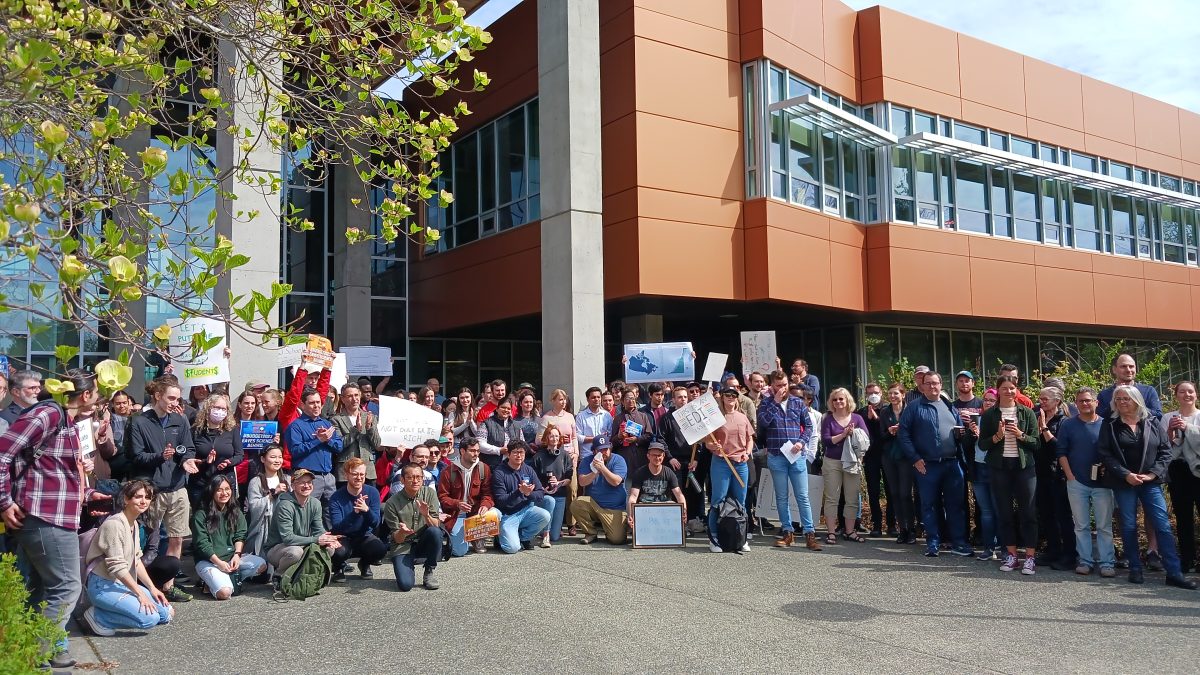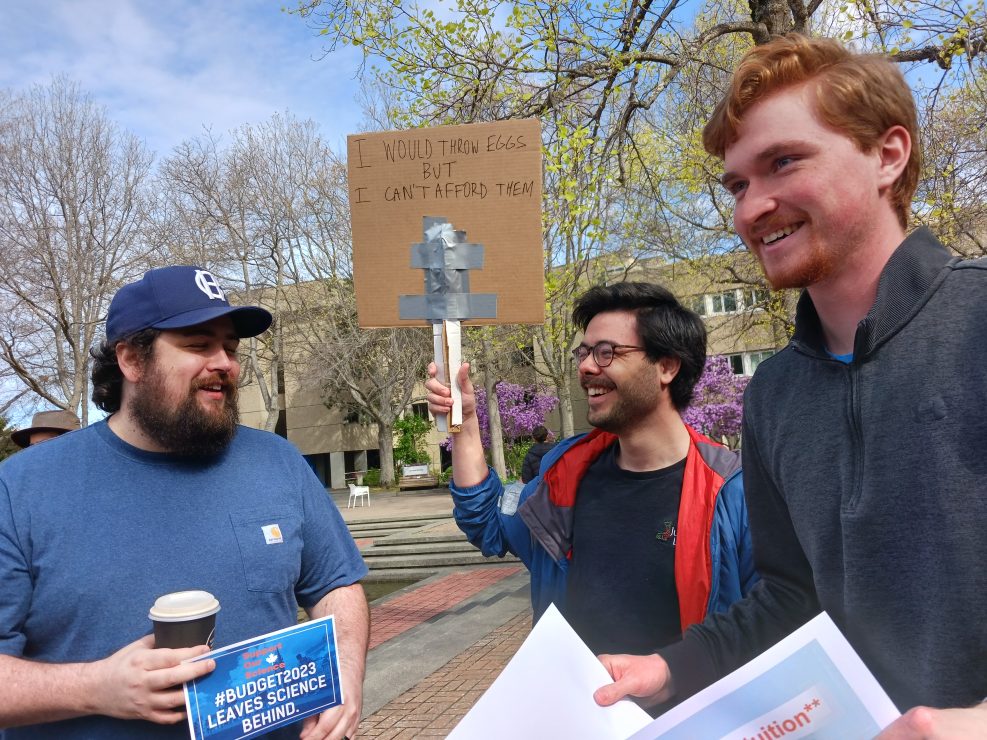Organizers say students are struggling as the federal government fails to raise graduate stipends for two decades running

Photo by Sarah Roberts.
On May 1, hundreds gathered outside UVic’s McPherson library as part of a Canada-wide walkout organized by Support Our Science (SOS). Thousands of students, faculty, and administrative staff across the country took part in the event in response to the 2023 federal budget, which does not include increased investment in educational and scientific research at Canadian universities.
This action follows an open letter sent to the prime minister and the minister for science development and innovation in late 2022, which asked for increased funding for researchers and graduate students who drive progress and innovation in Canada.
SOS says the failure by the government to address these concerns will have drastic impacts for current graduate and post-doctoral researchers.
Four student representatives organized the campus walkout at UVic, spearheaded by Emma Atkinson, (PhD candidate in biological sciences) with colleagues Micah Brush, (postdoctoral fellow in ocean sciences), Talen Rimmer, (M.Sc. candidate in ocean sciences) and Sarah Lane, (PhD candidate in forest biology).
“We are walking out in response to the federal government not increasing federal science funding in twenty years,” said Brush in an interview with the Martlet. “We were hoping to see increases in the 2023 budget, when that didn’t happen, [SOS] organized a national walkout.”
He added, “It would be completely unacceptable in any other field or job to not have a pay increase [in] over 20 years.”
Support Our Science highlights the need for increased investment in the Tri-Council Canadian Graduate Scholarships (CGS). These scholarships — funded by the Canadian Institutes of Health Research, the Natural Sciences and Engineering Research Council of Canada, and the Social Sciences and Humanities Research Council — are a major funding source for UVic graduate students.The annual stipend from a CGS is $17 500 for an MA student or $35 000 for a PhD student. This amount has been stagnant since 2003.
Despite promises of these stipends covering tuition and living expenses, many of the country’s best trainees in engineering and science are now living below the poverty line, according to SOS.

Photo by Sarah Roberts.
Chair of UVic’s Graduate Students Society (GSS) Wyatt Maddox has witnessed the financial burden on graduate students, including increased pressures to provide for spouses, children, and elderly parents. Maddox often hears “horror stories across campus, of students who are going to all sorts of soup kitchens, food banks, and any other source that they can to find food for families.”
Also at the protest was UVic’s President and Vice-Chancellor Kevin Hall, who spoke to attendees and joined the symbolic walk around Ring Road to the Office of the President.
In an interview with the Martlet, Hall said, “What [the protestors] are doing is helping support what [the university does], which is to lobby the government to get more investment into science and into research in this country.” Hall acknowledged that Canada is falling behind other nations in terms of investment into a knowledge-based economy.
On climate and sustainability, Hall said “For the future, the world’s going to depend on high quality research to really drive that change that we’re going to need.”
Maddox further highlighted the role of graduate degree holders in addressing national challenges.
“To have a robust healthcare system, to have a healthy economic system, and in order to tackle climate change — all three of those major industries are based on people with advanced degrees,” he said.
Maddox also noted the integral position of graduate students at UVic.
“The graduate student body is that connection between the faculty and the [undergraduate] students,” he said. “Faculty give lectures, but quite often it’s graduate students who are providing lab instruction, they are the ones there to support students, who can speak to students on an understanding basis.”
In December, after SOS sent their open letter, Minister of Innovation, Science and Industry François-Philippe Champagne, commented he was “seized” about the issue of funding for graduate research, and that it would be part of budget discussions.
In an email to the Martlet, a spokesperson for the Ministry of Innovation, Science and Industry said, “The government also acknowledges the calls from the research community to increase the number and value of scholarships and fellowships. The government remains committed to investing in Canadian research and is focused on how it can continue to support Canada’s world-class researchers, scientists and students.”
The spokesperson highlighted that the government provided $114 million over five years in Budget 2019, and $26.5 million each year ongoing, to create 500 more master’s level scholarships and 167 three-year doctoral scholarships. In addition the Natural Sciences and Engineering Research Council and the Social Sciences and Humanities Research Council raised the value of post-doctoral fellowships to $45 000 per year.
Maddox however said that compared to the hundreds of thousands of students currently enrolled in post-graduate study in Canada, there are simply not enough grants available. In 2021, an estimated 220 000 students were enrolled in master’s or equivalent programs in Canada. The same year, just 3 000 master’s and 3 000 doctoral scholarships were issued by the CGS.
The efforts to lobby the government will continue. After meeting with the GSS, M.P. for Victoria, Laurel Collins, agreed to raise the concerns on the House floor in Ottawa.
“Graduates and post-docs are the engine for innovation in this country, and we are running short on engine power; and our future is at risk,” Collins said, addressing walkout attendees. “This is only the beginning of engaging all of the Canadians that need us to make change in the knowledge-based economy.”






